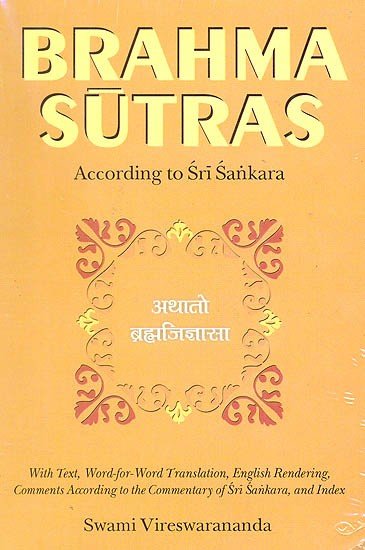Brahma Sutras (Shankara Bhashya)
by Swami Vireshwarananda | 1936 | 124,571 words | ISBN-10: 8175050063
This is the English translation of the Brahma-sutras including the commentary (Bhashya) of Shankara. The Brahma-sutra (or, Vedanta-sutra) is one of the three canonical texts of the Vedanta school of Hindu philosophy and represents an early exposition the Vedantic interpretation of the Upanishads. This edition has the original Sanskrit text, the r...
Chapter IV, Section I, Adhikarana I
Adhikarana summary: The meditation on the Atman enjoined by the scriptures is to be repeated till Knowledge is attained
Sutra 4,1.1
आवृत्तिः, असकृदुपदेशात् ॥ १ ॥
āvṛttiḥ, asakṛdupadeśāt || 1 ||
āvṛttiḥ—Repetition (is necessary); asakṛt—repeatedly; upadeśāt—on account of instruction by the scriptures.
1. The repetition (of hearing, reflection, and meditation on the teaching of the Self is necessary), on account of the repeated instruction by the scriptures.
“The Self, my dear Maitreyi, should be realized—should be heard of, reflected on, and meditated upon” (Brih. 2. 4. 5). “The intelligent aspirant after Brahman, knowing about this alone, should attain intuitive knowledge” (Brih. 4. 4. 21). The question arises whether what is enjoined in this is to be done once only or repeatedly. The opponent holds that it is to be observed once only, even as sacrifices like Prayaja are to be performed once only to yield the desired result. This Sutra refutes the view and says that the hearing etc. must be repeated till there is intuition of Brahman. Of course, if the knowledge of Brahman is attained by a single act, it is well and good; otherwise there is the necessity of repetition till the Knowledge dawns. It is the repetition of these acts that finally leads to intuition. The case of the Prayaja is not to the point. For there the result is Adrishta, which yields fruit at some particular future time, Here the result is directly perceived, and so, if the result is not there, the process must be repeated till the result is seen. Moreover, scriptural texts like the first one cited above give repeated instruction, thereby signifying the repetition of the means. Again ‘meditation’ and ‘reflection’ imply a repetition of the mental act, for when we say, ‘he meditates on it’, we imply the continuity of the act of remembrance of the object. Similarly with respect to ‘reflection’. It follows, therefore, that there must be repetition of the instruction. This holds good even in those cases where the texts do not give instruction repeatedly, as for example, in the second text cited above.
Sutra 4,1.2
लिङ्गाच्च ॥ २ ॥
liṅgācca || 2 ||
liṅgāt—On account of the indicatory mark; ca—and.
2. And on account of the indicatory mark.
“Reflect upon the rays, and you will have many sons” (Chh. 1. 5. 2). This text prescribes repeated meditation by asking to meditate on the Udgitha as the rays instead of as the sun. And what holds good in this case is equally applicable to other meditations also. And it is not true that repetition is not necessary. If it were so, the Sruti would not have taught the truth of the statement ‘That thou art’ repeatedly. There may be people who are so advanced, and so little attached to the world of sense objects, that in their case a single hearing of the statement may result in Knowledge. But generally such advanced souls are very rare. Ordinary people, who are deeply rooted in the idea of the body and the senses, do not realize the truth by a single enunciation of it. This wrong notion of theirs goes only through repeated practice of the truth, and it is only then that Knowledge dawns. So repetition has the effect of removing this wrong notion gradually, till even the last trace of it is removed. When the body consciousness is completely removed, the Self manifests Itself in all purity.
